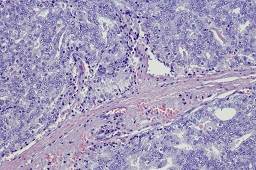Prostate Cancer Possibly Linked to Zinc Intake - Renal and Urology News


In a Spanish study, the highest vs tertile of dietary zinc intake was associated with a significant 66% increased relative risk of low-grade prostate cancer.
High dietary intake of zinc, a key trace element in normal prostate cell metabolism, may be associated with an elevated risk of low-grade prostate cancer (PCa), a new study suggests.
In a case-control study conducted in Spain, investigators found that men in the highest tertile of dietary zinc intake (greater than 10.53 mg/day) had a significant 66% increased relative risk of Gleason 6 PCa compared with those in the lowest tertile (less than 8.34 mg/day), in adjusted analyses, Enrique Gutiérrez-González, MD, of the National School of Public Health, Carlos III Institute of Health, Madrid, and colleagues reported in Nutrients.
The study found no significant associations between zinc intake and higher-grade or more advanced PCa tumors.
The investigators also looked at genotype information from selected patients with available DNA (514 cases and 81 controls) and found evidence suggesting that the possible deleterious effect of higher zinc intake on PCa risk is greater among men with a stronger genetic predisposition to PCa.
The investigators cited previous research showing that zinc is involved in the process of proliferation and apoptosis cell regulation in the prostate, and zinc concentrations are consistently lower in PCa tissue than in normal cells. Additionally, zinc depletion in PCa tissue has been related to Gleason score and tumor aggressiveness, Dr Gutiérrez-González and colleagues noted.
The study included 733 incident PCa cases and 1228 population-based controls. Investigators assessed dietary zinc intake using a food frequency questionnaire. Compared with controls, PCa patients had a higher percentage of men with a family history of PCa (21% vs 7%) and lower educational level. PCa patients also had a greater daily alcohol consumption.
Reference
Gutiérrez-González E, Castelló A, Fernández-Navarro P, et al. Dietary zinc and risk of prostate cancer in Spain: MCC-Spain Study. Nutrients. 2018; published online ahead of print.
https://www.mdpi.com/2072-6643/11/1/18
http://bit.ly/2Q0h07e


Comments
Post a Comment